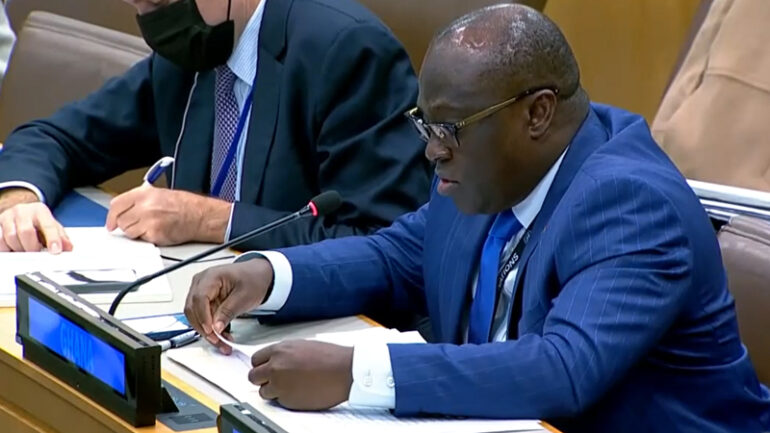Third Committee, 19th plenary meeting General Assembly, 77th session

- Posted by admin
- Posted in Statement & Remarks
Statement during the interactive dialogue with mandate holders on torture and other cruel, inhuman or degrading treatment or punishment
Thank you, Mr Chair,
I have the pleasure of speaking on behalf of the six States leading the Convention against Torture Initiative – also known as CTI – namely Chile, Denmark, Fiji, Indonesia, Morocco, and my own country, Ghana. I thank the mandate holders for their interactions, and also take this opportunity to congratulate Dr. Alice Edwards on her appointment as the new Special Rapporteur on Torture.
CTI is a cross-regional group of States pursuing international collaboration towards the universal ratification and effective implementation of the UN Convention against Torture – or ‘UNCAT’ – by 2024. We work to strengthen institutions, policies and practices through capacity building, technical support, confidential dialogues, and fostering platforms for sharing of best practices and experiences, aimed towards reducing and preventing the risks of torture and ill-treatment. At its core, CTI is committed to raising awareness on the benefits of becoming party to the UN Convention against Torture, and to supporting States on their pathways towards ratification and effective implementation of the Convention.
We recall that the prohibition of torture, in all circumstances, is a norm of jus cogens, universally accepted, and embedded in the vast majority of States’ domestic legal framework. In that context, the UN Convention against Torture offers States a practical roadmap, helping them to fight more efficiently against torture, with the ultimate objective of eradicating its occurrence once and for all. By enhancing every State’s efforts in prohibiting, preventing and prosecuting acts of torture, including through international cooperation, the Convention seeks to ensure that torturers cannot evade justice, anywhere in the world. Ratifying UNCAT also sends a powerful message that States are united in their conviction that torture can never be tolerated under any circumstances. It reinforces this fundamental rule of international law embedded in numerous human rights and humanitarian law treaties. Moreover, by strengthening the rule of law and the administration of justice, the ratification and implementation of the Convention against Torture peace, justice and by building strong institutions, contributing to reaching SDG 16. It ultimately contributes to strengthening citizens’ confidence in their government and building stronger communities.
We also emphasize the utility of the process of ratification of UNCAT in and of itself, which oftentimes creates an impetus for States to relook at and assess internal policies and practices, and engage in constructive conversations at the domestic level, which can create a conducive environment for positive change. Since CTI was launched in 2014, 19 new States have joined the Convention against torture, bringing the current total to 173 State parties. We congratulate and welcome the newest State Party, Suriname, who ratified in November last year, bringing in the laudable achievement of full UNCAT ratification amongst the States of South America. The Convention against Torture Initiative stands ready to support States in their ratification journey and in their efforts to implement the Convention. We are fully understanding that each country faces specific challenges and as such, we aim to provide States with support tailored to their needs.
CTI has been pleased to enjoy support from a growing Group of Friends open to all UN Member States, and we take this opportunity to invite States to join this grouping, which unites States in their shared vision of a world free from torture.
To conclude, on behalf of CTI and its Core States, I would like to thank the mandate holders for their important work, and their continued support and collaboration with CTI.
I thank you Mr. Chair
